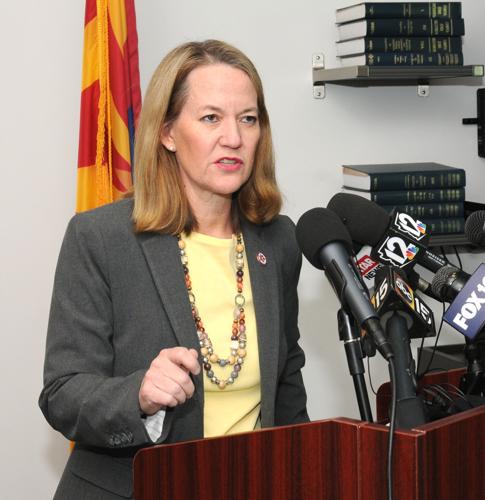PHOENIX — Attorney General Kris Mayes filed two lawsuits Wednesday against Amazon, accusing the online retail giant of illegal practices that make consumers pay more than they should for products and of throwing roadblocks against cancelation of services.
One complaint is based on how Amazon lists products. Mayes said the website is designed to convince shoppers that what’s listed first is the best buy.
But the lawsuit says what consumers see first are items sold either directly by Amazon or by third-party sellers who effectively pay extra fees.
“The result is that consumers routinely overpay for items that are available at lower prices from other sellers on Amazon,’’ the lawsuit states.
Mayes said it’s not because consumers don’t care about prices or they’re basing their decisions on other factors, “but because Amazon has chosen to display the offers for which it will earn the highest fees.’’
The other lawsuit relates to the company’s Prime membership, in which Amazon collects regular fees from subscribers in exchange for benefits including free shipping.
Mayes said that until last year, Amazon used a system where it took at least six separate actions by consumers to cancel Prime membership online. The lawsuit also said the process relied on “dark patterns’’ to manipulate consumers into keeping their memberships.
According to Mayes, the company eliminated the practice last year, shortly before the Federal Trade Commission filed its own litigation. But even with that, she said consumers were stuck for years paying for services they did not want.
Mayes wants a court order to prevent the company from doing it again, but also civil fines as well as a requirement that it surrender any profits it obtained from what she says was unlawful conduct.
“We are surprised and disappointed by these cases,’’ said Amazon spokesperson Tim Doyle.
He said Mayes filed the cases “without reviewing a single document from Amazon, resulting in a fundamental misunderstanding and mischaracterization of how Amazon’s businesses work.’’
Doyle rejected arguments that Amazon’s customers and sellers are harmed.
“These suits would force Amazon to engage in practices that actually harm consumers and the many businesses that sell in our store, such as having to feature higher prices,’’ he said.
He also denied that Amazon makes it difficult to drop the company’s Prime service.
In both cases, Mayes is using state consumer fraud laws to go after the international giant. That allows her to have it handled in state court here, under state laws, versus before a federal judge.
“Arizona consumers deserve to be treated fairly and without deception by big corporations like Amazon,’’ she said in a prepared statement. “And small businesses deserve a level playing field.’’
The state charges against Amazon over discriminating against other retailers on its site is similar in some ways to the FTC lawsuit filed last year.
The first element involved is what happens when consumers search for a product.

Attorney General Kris Mayes
According to the lawsuit, Amazon has an algorithm that selects just one seller’s offer to appear in the “Buy Box’’ on a page, allowing consumers to add it to their cart with a single click. The company allegedly designs its product page to obscure the fact that other offers also are available, something Mayes said results in nearly 98% of purchases being made via the Buy Box.
But the problem is deeper, she said.
“Consumers reasonably believe that the Buy Box is the best price available in the marketplace for a given item,’’ the lawsuit states. “But they are often wrong. The Buy Box algorithm is biased in favor of Amazon first-party retail offers or offers from third-party sellers who participate in Fulfillment by Amazon.’’
That program charges those retailers “hefty fees’’ to store their inventory, pack their products, ship orders, handle returns and communicate with customers, Mayes said. What that means, she said, is that those from whom Amazon doesn’t get any extra profits don’t wind up getting Buy Box treatment, even if they offer the same item for less.
Also illegal, according to the lawsuit, is an Amazon policy that makes it a violation for a third-party seller to offer an item at any other website for less than it is available on Amazon.
“This is true even though Amazon charges the highest fees in the industry,’’ Mayes said, saying about 27% of every dollar a consumer spends on Amazon goes to that company rather than the seller.
“In other words, if an Arizona business owner sells a sweater on Amazon for $50, Amazon deems it a violation of its Business Services Agreement for the business owner to sell the same sweater on her own website for $45 — even though she is not paying fees to sell on her own site,’’ the lawsuit says.
“This protects Amazon from competition in its capacity as an online retail marketplace provider,’’ the suit says. “Amazon thus ensures its dominance among online retail marketplaces while keeping prices for Arizona consumers artificially high.’’
Get your morning recap of today's local news and read the full stories here: tucne.ws/morning






